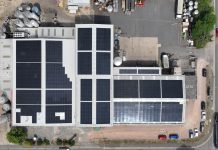Low-carbon hydrogen electrolysed onsite at Britain’s solar & wind farms moved from vision to incipient reality this week, as clean power developers BayWa r.e. and Octopus’s clean H2 unit plighted their troths.
On the German operator’s UK sites, both current and future, the duo have committed to install up to 30 MW in total of Octopus Hydrogen’s electrolysers, compressors and tanks.
The pair’s new MoU envisages initial output of 6.5 tonnes per day of the green gas, possibly as early as next year. Green, because H2 electrolysed with renewable electricity inflicts less environmental damage than ‘blue’ H2, which is steam-reformed from hydrocarbons.
BayWa re operate 31 projects already in the UK, with total capacity of 536 MWp installed, and 1.4 GW managed. Early into onshore wind, its built ventures include 30 MW at Frailsthorpe, Yorkshire, and the UK’s first subsidy-free turbines, 24MW at Inverclyde. In solar PV, it lists five farms all over 20 MWp. It plans more.
An operational rule of thumb is that between 30% and 40% of each site’s power would run its electrolyser, avoiding transmission costs as the kit splits clean gas out of water. Britain’s grid would take the rest.
Will Rowe, pictured, founded Octopus Hydrogen last year.
“Our partnership with BayWa plays an important role by providing excellent renewable sites and the opportunity to share expertise,” he said. “Collaboration helps to unlock the potential of the green hydrogen market in the UK and beyond.”
The pair’s announcement contained no consideration of the venture’s implications for rural road access by tankers and trucks.
The Johnson administration is committed to adding 5GW of green and blue hydrogen capacity by 2030. The environmental equivalence its Hydrogen Strategy grants to both variants prompted the government’s key advisor on the gas, Chris Jackson, to resign on the eve of the policy’s launch in August.
Baywa re already runs a Dutch pilot making green H2 at a 50MW solar farm.
Stefan Tait, the operator’s UK head of energy storage and hydrogen, commented: “Our partnership with Octopus builds on the innovative work we are already doing across Europe in producing green hydrogen from renewable energy, and we look forward to jointly deploying these concepts to help meet the UK’s energy transition targets”




